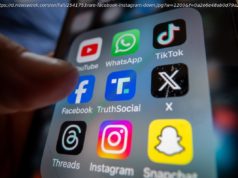Swamp status: full.
It looks like Chinese firm ZTE is no longer going to be facing sanctions with the U. S. Commerce Secretary Wilbur Ross made the announcement of a deal this morning while on CNBC.
The department said the deal includes a $1 billion penalty against ZTE and a U. S.-chosen compliance team.
“We are literally embedding a compliance department of our choosing into the company to monitor it going forward. They will pay for those people, but the people will report to the new chairman,” Ross said in a “Squawk Box” interview…
The settlement deal includes $400 million in escrow to cover any future violations as well as requiring ZTE to change its board of directors and executive team in 30 days.
“If they do violate it again, in addition to the billion dollars they are paying us up front, we had them put $400 million in escrow. The total deal is $1.4 billion. That money will be forfeited if they violate anyting … and we still retain the power to shut them down again,” Ross said.
“This is a pretty strict settlement,” he added. “The strictest and largest settlement fine that has ever been brought by the Commerce Department against any violator of export controls.”
“This should serve as a very good deterrent not only for them but for other potential bad actors,” he added.
The Trump administration was quite irked ZTE was doing business with North Korea and Iran and ruled they couldn’t buy products from multiple U. S. companies in April. The company was apparently worried about its own survival due to the sanctions. Their solution? Get swampy by hiring a former Trump campaign official as a lobbyist. Via Lachlan Markay at The Daily Beast (emphasis mine).
ZTE Corporation struck a contract with D. C. lobbying and public relations powerhouse Mercury Public Affairs on May 14, a day after Trump tweeted that he would consider lifting the penalties that had been imposed on the company as punishment for its violation of sanctions against Iran and North Korea.
The Mercury consultant working on the account is Bryan Lanza, a veteran of the Trump 2016 presidential campaign. Less than two weeks after Lanza’s work began, the Trump administration announced that it had reached a tentative deal to ease those penalties, a move criticized by lawmakers of both parties.
Many factors likely contributed to the resolution of the ZTE penalties, including efforts to leverage ongoing trade negotiations with China. But the swiftness of the Trump administration’s efforts to reach an agreement with the company—and the equally swift decision of that company to bring on a prominent Trumpworld figure—underscores the new world of influence peddling in Washington D. C. An infamously impulsive president, prone to bucking political norms and changing legislative priorities, has compelled companies to turn to K Street just to keep up.
Swamp gonna swamp!
This is the problem when government gets too powerful and starts picking winners and losers. Those who could be influenced by the government hire people who can wheedle their way into the halls of said government and procure favors of one kind or the other. It’s exactly what George Clinton warned in the Anti-Federalist papers when discussing the dangers of a powerful executive. The solution isn’t necessarily a ban on lobbyists, but being willing to hold politicians more accountable when it’s obvious they’re being bought by lobbyists to do legislation or executive action, in this case, which benefits one business over the other. One great example of cronyism is Marco Rubio’s 2015 push for an online gambling ban at the behest of casino magnate Sheldon Adelson. That reeked of cronyism and Rubio was rightly criticized for it.
There are obviously people who are going to praise the settlement because it shows Trump can be tough on China, and get extra money into government coffers. The question is still whether this is an appropriate role of government, especially from the executive. There were strict limits set on the government in the Constitution, something all elected officials have done their best to try to navigate around through one interpretation of the Constitution or another. The failure of the American government to follow the rules is one reason why we’re in this mess of politicians picking winners and losers.
It’s certainly possible the settlement with ZTE will make trade negotiations with China much easier, and Trump will get some sort of ‘fair trade’ settlement. The only question is whether it’s worth going all swamp to do so.






